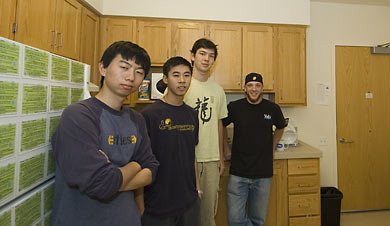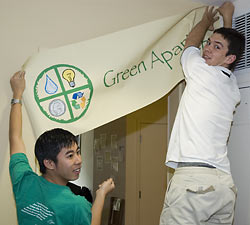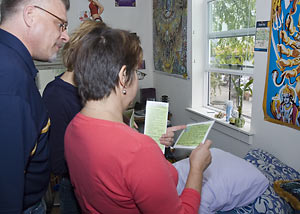UC Berkeley Press Release
 |
Gathered in the kitchen of their "green apartment" are Berkeley undergrads (from left) Jonathan Hu, Edward Chen, Tim Edgar and Travis Zack. The refrigerator is covered with eco-tip magnets they pass out to visitors. (Bonnie Azab powell photo) |
Tours begin of eco-friendly "green apartment"
BERKELEY – Empty pizza boxes, beer cans and overflowing garbage is an image many might associate with four college guys in a two-bedroom apartment. But that's not quite the case for University of California, Berkeley, undergraduates Travis Zack, Jonathan Hu, Tim Edgar and Edward Chen.
 Chen and Edgar hang a sign over their front door welcoming visitors to their apartment in the Channing-Bowditch complex. (Steve McConnell photo) |
The living room of their southside Berkeley student dwelling does look like a typical bachelor pad, with a Samuel L. Jackson "Shaft" poster on the wall and a tangle of Xbox video game controllers on the coffee table. But what's strewn about are organic food boxes and salad bags, and it's the recycling bin that's full to the brim. You'll also find energy-saving appliances in their home, and environmentally-sensitive household and personal hygiene products.
These four residents of the campus's new Green Apartment may not be neat freaks, but their hearts are definitely green.
"It's not that we're cleaner than anyone else, but our mess is more environmentally friendly," said Hu, 19, a sophomore majoring in political science.
Recently, scheduled tours began of the Green Apartment to demonstrate sustainable living in student housing. The apartment in the Channing-Bowditch student housing complex is the latest addition to an expanding UC Berkeley effort by the Green Room Committee to educate the campus community about recycling, water and energy conservation and about purchasing decisions.
The Green Room Committee is run jointly by UC Berkeley's Recycling and Refuse Services, Residential & Student Service Programs, Berkeley Green Campus, and the Student Sustainability Education Coordinator Program.
In the Green Apartment are appliances such as refrigerators, electronics and lights - all approved by Energy Star, a government-backed program that certifies energy efficient products. It also is outfitted with Earth-friendly shampoo, deodorant, dish and laundry detergent, not to mention jugs of filtered water, cloth napkins, natural fiber bed linens and more.
 "Green" tourists read one of the many laminated cards spread around the apartment describing its bedding, appliances, personal care and cleaning products and other Earth-friendly features. (Steve McConnell photo) |
During tours, each item is labeled with a description of what it is and why it's good for the planet. Plus, the green guys are on hand to answer questions, and do so with great enthusiasm. They also give tips on cost-free behavioral changes students can make to reduce their impact on the earth.
"Students seem to really love consuming as much as absolutely possible and not really caring about the consequences," said Zack, 20, a physics major from Maui, Hawaii. "I hope this and other things will change that."
While visitors can expect to see products by Tom's of Maine, Avalon Organics and Seventh Generation, organizers stress that they are not endorsing any particular product, but simply showing examples of goods with preferred ingredients and other features, regardless of the brand.
"We wanted to give the room a holistic concept, connecting the dots between the things students learn in the classroom and the choices they make in their everyday lives, said Desirae Early, a junior majoring in environmental economics and policy, a Green Campus Program coordinator and a Green Room Committee member.
Various "green" programs, including the Global Environment Theme House at UC Berkeley's Foothill residence hall, have sprouted around campus since 2002 when University of California Regents adopted a policy toward more sustainable practices and environmental stewardship after being presented a research paper outlining how to achieve these goals. This set off a series of energy conservation efforts at UC Berkeley, including green demonstration areas.
 The apartment's shared bathroom is filled with a host of personal care products chosen for their environmental sensitivity, along with signs describing their ingredients, price and ecological advantages. (Steve McConnell photo) |
The effort drew wide attention last year with the unveiling at UC Berkeley of the "Green Room," the nation's first fully-outfitted, eco-friendly residence hall room. The idea began when the San Rafael-based Strategic Energy Innovations (SEI), approached environmental student leaders here about outfitting a UC Berkeley residence hall room with Energy Star appliances through a grant from the U.S. Department of Energy. SEI is a non-profit group that helps schools, businesses and other entities meet energy conservation goals.
The students brought the proposal to the Residential Student Services Program, and together they decided to expand the concept beyond appliances to include an educational component on energy conservation and waste management. Grants for the project have been provided by the Alameda County Waste Management Authority and the Chancellor's Advisory Committee on Sustainability.
Thus was formed the "Green Room Committee," which set about procuring eco-friendly products from local vendors and private donors and finding a student who would be willing to live in the room and show it off on a regular basis. They found sophomore Rachel Robertson, who in Putnam Hall opened her Green Room to the campus community on Oct. 21, 2005.
It drew 230 visitors throughout the year and was honored at the Environmental Protection Agency's eighth annual Environmental Awards Ceremony in San Francisco. That success led the Green Room Committee to expand the concept to a "Green Apartment."
Dozens of students applied to live in the Green Apartment, but Zack, Hu, Edgar and Chen were chosen because of their demonstrated commitment to giving tours and "sharing their space." Also, three of them had already lived at the campus's Global Environment Theme House, which provides housing for about 20 environmentally conscious students.
Edgar, 20, who is majoring in engineering and computer science, said he got serious about the environment when he was a high school student visiting his sister at UCLA. He recalled how it rained, and his soaked notepad dried to a crusty yellow. When his sister explained that the smog was responsible, he was disgusted.
| 'You don't have to do a lot to make a difference. ... It's really not that difficult. All it requires is a little thought.' -Travis Zack |
"When it comes down to why I'm doing this, I just think back to that day," he said. "I don't want my kids one day to go out in the rain and be grossed out by it. I want them to enjoy the world."
Zack says he was raised in an environmentally aware household with parents who were "ex-hippies." He signed up for the Green Apartment to demonstrate how easy it is live a sustainable life.
"You don't have to do a lot to make a difference - like not leaving the water running when you're brushing your teeth, separating before you throw things out. Looking at what you're buying and where it's coming from," Zack said. "It's really not that difficult. All it requires is a little thought."
Hu said he joined the project to challenge the assumption that "a kid on a college student's budget cannot afford all these products, cannot afford 10 minutes out of the day to separate recycling and read all the ingredients because that's 10 minutes that's not going to studying for the next midterm and into writing the next paper that's due."
He said he and his roommates have an "obligation to get the message out to as many people as possible, to live by example, and teach through that example. If it's possible for a college kid, hey, it's got to be possible for everyone else."
Hu added that women seem to find environmentally sensitive guys appealing. "I know that whenever I mention I'm part of the Green Apartment, it's always the females who are asking follow-up questions," said Hu. "The males are, like, 'That's cool, are your walls painted green?'"
As for cooking wholesome organic meals together, Zack gently reminded: "We are still all guys. A lot of the time we'll just eat a bowl of cereal or take something out of the freezer. We're college students with busy schedules."
But not too busy to separate the trash.

